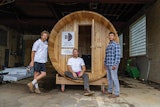
It wasn't just the bearded sheep from Kandahar. Even before bin Ladin grew to the proportions of Godzilla, the American people had begun to throttle back from the roaring prosperity of the '90s. The fall in stocks and economic output that followed the WTC were just official notification - shadows of objects we've yet to identify in hindsight.
We were changing fast, even before Sept. 11. I think that Americans were already starting to question the price of unbridled prosperity. As a nation, I think we were preparing to embrace something besides naked wealth.
Make no mistake, it wasn't new technologies or governmental policies that created the economic boom of the last decade (of course they played a role), it was the result of the stubborn individual determination of Americans to work harder and longer in order to make and spend more money. That simple decision on a grand scale resulted in startling economic growth.
Our workforce productivity increases, which any economist will tell you were the turbocharger of the great economic expansion, were just that, millions of highly motivated individuals being incredibly, amazingly productive at work because they wanted the rewards of that productivity at home.
And that will was reflected in our politics. It truly was "the economy, stupid." We asked our government to secure us cheap, plentiful energy, beneficial trade agreements, and get out of the way.
While that prosperous will remains, I think Americans have reevaluated a few things - taken stock of their lives and lifestyles - and they're deciding that while affluence is good, it's not an end in itself. It has to be a byproduct of something more important. The stark mortality of Sept. 11 and its aftermath underlined this point in thick black ink.
In short, the restless American spirit is on the move again, and it's looking beyond the billfold. Dollars, while by no means out of style, are not the motivator they once were.
We are called to live well and fully - and that's what has dawned on many of our most productive workers. That means working well, but within the context of a meaningful life.
The Census Bureau reported in October that for the first time in 25 years, there was a decline in the proportion of mothers of infants in the workforce. It was only a shift of a few percentage points, but I believe it heralds a more profound transformation to a society with a more balanced approach to work, family and personal time, and it's going to be an issue for people who manage workers.
In many cases, that's going to mean a reduced or more flexible work schedule to make room for growth - either as a parent, as a member of a community, or simply as a human being. Management policies are going to have to strike this new balance as well, as the demands of the production team confront a workforce reevaluating its own humanity.
The shift is still difficult to make out. It's hard to gauge change in the depths of the human soul - the joy of a sunrise that is savored and consumed, not just noted in passing as the traffic light turns green, or of a moment with a child taken in its full measure, undiluted by thoughts of projects or deadlines or concerns. It's easier to count beans and pork bellies.
But I think in this way, from what I'm seeing in my little corner of America, while factory output is down, the human economy is booming, and 2002 is shaping up to be a pretty good year.












































